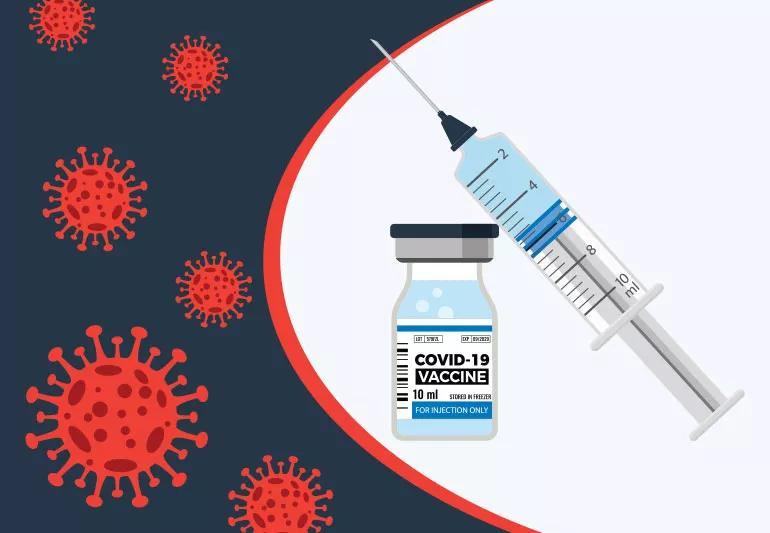Advertisement
7 facts about the FDA’s new warning regarding the one-shot vaccine

If you received Johnson & Johnson’s COVID-19 vaccine, recent news headlines about its connection to a rare nerve syndrome may have you feeling nervous. But do you need to be?
Advertisement
Cleveland Clinic is a non-profit academic medical center. Advertising on our site helps support our mission. We do not endorse non-Cleveland Clinic products or services. Policy
The U.S. Food and Drug Administration (FDA) recently issued a warning that the single-dose vaccine is associated with an increased risk of developing Guillain-Barré syndrome (GBS), a rare autoimmune disorder that attacks the body’s nerves.
Here’s what you need to know, as explained by neurologist Kerry Levin, MD.
First things first: The likelihood of being diagnosed with GBS after receiving the Johnson & Johnson COVID-19 vaccine is extremely small — about 0.0008%. And Dr. Levin says milder cases of GBS may go undiagnosed, never causing enough concern to warrant a doctor’s visit.
The FDA reports that 12.5 million doses of the Johnson & Johnson vaccine have been administered — about 8% of the population of fully vaccinated people in the United States. As of July 13, 2021 (the day the FDA issued its warning), 100 cases of Guillain-Barré had been reported in individuals who received that vaccine. Of those cases, 95 were considered serious and required hospitalization; one case resulted in death.
The FDA is also careful to point out that although evidence suggests an association between the vaccine and an increased risk of GBS, that evidence is “insufficient to establish a causal relationship.”
Advertisement
In the U.S., an estimated 146 million fully vaccinated people have received either the Moderna or Pfizer COVID-19 vaccines (both of which require two doses). To date, the FDA has not seen a statistical increase in GBS in patients who received the Moderna and Pfizer COVID-19 vaccines.
Symptoms of GBS typically develop within 42 days of vaccination, and the first symptom is often numbness or tingling in your hands or feet.
“The typical progression of GBS is from the legs up to the arms over a one-week to four-week period,” Dr. Levin says. “That can be accompanied by progressive heaviness and weakness in the legs the arms — and later on, there can be difficulty with swallowing and breathing, but those are unlikely to be initial presentations.”
Other symptoms of GBS may include:
“It is much more common to get GBS from an infection than from a vaccination,” Dr. Levin explains.
Each year in the U.S., an estimated 3,000 to 6,000 people develop GBS, typically triggered by a viral or bacterial infection, including the flu — or even COVID-19.
That’s right: Dr. Levin says there are examples of people developing GBS immediately following infection with COVID-19.
Though symptoms can last weeks or years, most patients recover within several months.
“In general, the prognosis is very good, and we have very effective ways of treating GBS,” Dr. Levin says. “Most people make a complete recovery.”
If you are experiencing symptoms of GBS — especially tingling, numbness or weakness in your arms and legs — see a medical professional for evaluation.
Although the Johnson & Johnson shot is the only COVID-19 vaccine that has been linked to Guillain-Barré syndrome, it’s not the first time a vaccine has been linked to the disorder.
In rare cases, people have developed GBS after receiving the flu shot — about one case of GBS for every 1 million influenza vaccines administered. But why?
“There’s evidence that GBS is an autoimmune reaction in which the body produces antibodies directed toward myelin, the insulation of the nerves,” Dr. Levin explains. “Vaccines tend to rev up your immune system, which could rev up antibodies that recognize different tissues within your body as foreign — even though, of course, they are not foreign.”
It’s worth noting that, aside from the flu vaccine, there’s currently no conclusive association between GBS and other vaccines, though it hasn’t been ruled out, either.
Advertisement
Dr. Levin reiterates that the risk of developing Guillain-Barré syndrome after receiving the Johnson & Johnson vaccine is very small, while unvaccinated people’s risk of contracting COVID-19 remains enormously high — especially with variants on the rise.
“The statistics are highly in favor of vaccination,” Dr. Levin says. “If 100 people have developed GBS as a result of 12.8 million people receiving the Johnson & Johnson vaccination, that’s still an extremely small number when compared to the likelihood of getting a serious COVID-19 infection. If you exposed the same number of people to COVID-19, many more than 100 would develop that illness.”
In other words: The prevailing medical recommendation is still that all eligible people should get vaccinated against COVID-19.
Advertisement
Learn more about our editorial process.
Advertisement

Dehydration, spinal fluid leaks and other conditions can cause positional headaches when you stand up

This satisfying, involuntary act of yawning and stretching helps release tight muscles

Yes, you can — new research shows the popular over-the-counter pain reliever is safe

This automatic flight-or-fight response makes your hair stand on end, causing little harmless bumps to form for every hair follicle

These rare tumors are almost always a side effect of a condition called neurofibromatosis type 1, so asking if this is the case is important

Staying active and documenting symptoms can help you, and your care team, stay on top of this chronic condition

From influenza and COVID-19 to pneumococcal, shingles and more, vaccines help keep you healthy

Children as young as 6 months should get vaccinated, but dosage guidelines depend on kids’ ages and past vaccines

If you’re feeling short of breath, sleep can be tough — propping yourself up or sleeping on your side may help

If you fear the unknown or find yourself needing reassurance often, you may identify with this attachment style

If you’re looking to boost your gut health, it’s better to get fiber from whole foods